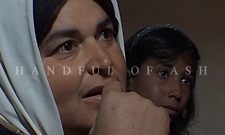1st ever conference on FGM in Middle East
FGM not merely an African problem; high rates in the Middle East
The first conference ever on female genital mutilation (FGM) in the Middle East is currently taking place in Beirut, Lebanon, with participants from Iraqi Kurdistan, Central Iraq and Yemen with input from experts from Indonesia and Egypt. The groundbreaking event, organized by the non-governmental organizations Wadi and Hivos, is serving as a first common platform for experts and activists fighting FGM in the Middle East. Its purpose is to learn from each other, create a network and cooperation structure, and develop a coherent transnational strategy to eradicate FGM.
Until recently FGM was considered to be practiced mostly in African countries. Not much information is available about this practice in the Middle East. However, research, publications and various other evidence indicate that it is also practiced in Yemen, Iraq, Iran, Syria, Oman and Saudi Arabia. FGM is still very much a taboo issue in the Middle East. It is high time to break the silence about this gross violation of human and women’s rights.
Politicians, the media, international organisations, most notably the UN, have since long recognized FGM in Africa and treated it as merely an African issue. Considering the astonishingly high FGM rates in the Middle East it is striking that the above mentioned actors are still treating the problem in the Middle East much as a side issue. The Beirut conference was set up in order to draw the world’s attention to this neglected fact and send a strong message that it is time for concerted action.
For instance, in the Beirut conference a physician from Southern Iraq presented evidence (interview recordings) in public which indicates FGM is also practiced in Central and South Iraq. The practice is a complete taboo for Iraqis and flatly denied by the Iraqi Central Government.
Most of the heavily affected countries in Asia are part of the Muslim World. Many Muslim religious leaders are playing a considerable role in the justification of the practice, however participants agreed that it should not be labeled a religious practice. In each country, religion, politics, the media and of course local communities themselves must be won for the cause to play a positive role in the eradication of FGM. Public awareness is as important as pressure on the respective governments to act.
The Beirut conference calls upon the people and governments of the countries in the Middle East and the international community to start addressing FGM, and notably:
- Request civil society organizations to provide data about FGM in their respective countries;
- Pressure governments of countries in the Middle East to take up FGM as gross human rights violation;
- Pressure governments from the Middle East to collect credible data and statistics about prevalence of FGM;
- Set up a regional network addressing FGM in the Middle East;
- Make FGM a core issue within UN policies active in countries in the Middle East where FGM is practiced;
- Request EU, UN and US to address FGM as a core issue within their foreign policies towards countries in the Middle East.
Background information on FGM (source: WHO):
FGM is recognized internationally as a violation of the human rights of girls and women. It reflects deep-rooted inequality between the sexes, and constitutes an extreme form of discrimination against women. It is often carried out on minors and is a violation of the rights of children. The practice also violates a person's rights to health, security and physical integrity, the right to be free from torture and cruel, inhuman or degrading treatment, and the right to life when the procedure results in death. FGM comprises all procedures that involve partial or total removal of the external female genitalia, or other injury to the female genital organs for non-medical reasons and is mostly carried out by traditional circumcisers.
Jessie Hexspoor, Hivos and Thomas von der Osten-Sacken, Wadi; Beirut the 19th of January 2012







 Clinton: 'Cultural Tradition' is No Excuse for Female Genital Mutilation
Clinton: 'Cultural Tradition' is No Excuse for Female Genital Mutilation


